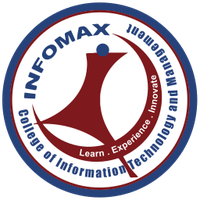
Apply Now
Infomax College of Information Technology and Management offers a Master of Business Administration (MBA) program, recognized globally through its affiliation with the Asia Pacific University of Technology and Innovation (APU) in Malaysia. This program is designed to develop visionary leaders and strategic thinkers, equipping them with the advanced business skills required in today's complex global economy.
The curriculum covers essential business disciplines, including strategic management, finance, marketing, human resources, and operations, with a focus on technology integration and innovation. Students benefit from a dynamic learning environment led by experienced faculty and have access to modern computing facilities, smart classrooms, and a comprehensive library. Graduates are well-prepared for senior leadership roles, entrepreneurship, and consulting in various industries. The program’s emphasis on strategic decision-making and technological proficiency equips them to drive organizational growth and excel in a competitive market.
Aim of the Course
- An opportunity to develop knowledge and skills as a business manager in various work settings
- A platform to improve effectiveness in any present and future management roles
- Developing capabilities in the integration of knowledge, skills, and personal qualities that are applied appropriately in response to various circumstances.
DURATION: 2 Years (4 Semesters)
CREDITS: 60 Credit Hours
RECOGNITION: Approved by Ministry of Education, Nepal
Equivalence by Tribhuvan University
CLASS TIMING
Morning: 6:00 AM - 9:30 AM
DEGREE AWARDED BY: Asia Pacific University of Technology and Innovation
Eligibility
- Bachelor’s degree with a minimum CGPA of 2.50 (45%) or equivalent
Career Option
- Banking Manager
- Business Development Manager
- Finance Manager
- Human Resource Manager
- Logistic and Supply Chain Manager
- Operation Manager
- Procurement Manager
- Project Manager
- Sales and Marketing Manager
- Market Researcher
- Business Consultant
- Business Research Analyst
- Entrepreneur
Course Structure
First Semester
Organization Behavior
Human Resource Management
Technology Management
Managerial Accounting
Managerial Economics
Second Semester
Digital Execution
Managerial Finance
Managing Organisations
Global Strategic Management
Flourishing in the Workplace
Third Semester
Entrepreneurship
Research Methodology
Global Marketing Management
Digital Marketing Tools and Trends
Accounting & Finance for Managers
Fourth Semester
Statistical Decision Making
Project
Business Ethics & Corporate Responsibility
Project HR and leadership
Evaluation Pattern
- Individual assignments: It is designed to assess students' understanding of a specific subject, topic, or concept, and to evaluate their ability to apply knowledge, think critically, and solve problems.
- Group Assignments: Designed to develop teamwork skills among students and to encourage collaboration and communication. It also promotes a shared learning experience where students can leverage each other’s strengths, support one another, and contribute collectively to the completion of the task.
- Test: A method used to evaluate students' knowledge, skills, abilities, or understanding of a particular topic or subject, in order to assess their performance and progress on a regular basis. This can include multiple-choice or subjective questions.
- Quiz: A short-format assessment with multiple-choice questions designed to gauge students' understanding of recently taught topics and to obtain immediate feedback.
- Presentation: Group and individual assignments are presented in front of faculty and classmates using visual aids and software. Through this process, students learn how to pitch ideas, develop confidence, improve articulation and body language, understand the importance of time management, and learn how to connect with the audience.
- Case Studies: This method involves an in-depth examination and analysis of a specific individual, group, event, or situation to gain a comprehensive understanding of the subject under investigation and to draw insights, identify patterns, and make conclusions based on the data collected.
- Examination: Conducted at the end of the semester to assess students' understanding of the subjects through case studies, long-answer questions, short-answer questions, and multiple-choice questions
